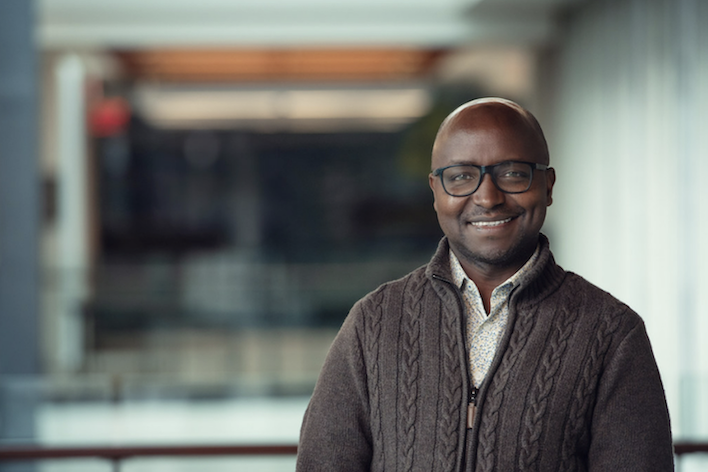CANADIAN IMMIGRATION UPDATES: Applicants to Master’s and Doctoral degrees are not affected by the recently announced cap on study permits. Read more

Meet UBC Sauder’s new faculty – Deo Nizonkiza

At UBC Sauder, faculty members are more than just ‘professors.’ They conduct impactful research that is changing how society views the world while also inspiring students to pursue their academic passions and become the thoughtful, values-driven leaders the business world needs. This year, UBC Sauder welcomes ten new lecturers and tenure-track faculty to the school. In this article, we introduce you to Deo Nizonkiza, Full-time Lecturer in the Law and Business Communications Group.
Where are you from, and what brought you to UBC Sauder?
I’m originally from Burundi, a small country in Africa, where I still have family. I hold a PhD in Applied Linguistics (University of Antwerp, Belgium, 2012). Upon completion of my PhD, I undertook postdoc research (North West University, South Africa) with a focus on academic literacy among first-year university students. I’m joining the UBC Sauder School of Business with a wealth of teaching experience, both local (mainly the School of Journalism, Writing, and Media—UBC, Douglas College, and McGill University) and international (University of Burundi—Burundi). And I’m joining from the Faculty of Arts, School of Journalism, Writing, and Media (JWAM), UBC where I have been teaching for the last three years. UBC Sauder is one of the top schools in the world, so I feel privileged to have the opportunity to join and work for the school and belong to the UBC Sauder community.
What are your areas of research or your fields of expertise, and how did you get into this field?
My research interests include: lexical phrases (typical word combinations) in English as an Additional Language (EAL) proficiency, lexical phrases in academic literacy, lexical phrases in academic writing, using corpora to improve academic writing, and dynamic assessment in teaching lexical phrases. I started research as a language teacher, and language teaching should always result in effective communication, be it in speaking or in writing. One contributing factor to effective communication—lexical phrases (with available tools and contexts)—became the focus of my research.
What continues to fuel your research or interest in these areas?
Discovering the role of lexical phrases in effective communication has always been my topic of interest. I started my PhD research with one broad question: ‘how do I contribute to my students’ fluency / overall proficiency in English as an additional language’ (foreign language in Burundi)? Lexical phrases were examined as the main factor in achieving this. Upon completion of my PhD, I wanted to extend the results to another context, academic literacy (reading and writing), which I also did when I joined McGill University. Especially, at McGill, the contribution of online tools (corpora) in overall academic communication in English was examined from students’ perspectives. The use of corpora (online tools) and the role of dynamic assessment in teaching these important phrases are my focus right now. So, my research curiosity seems to be driven by an understanding of the role of lexical phrases in effective communication.
What inspires you to teach?
The best moment I enjoy teaching is when I see my students successfully communicate their ideas in speaking and/or in writing. This could be one of the ‘best returns on investment’ I would hope for as a lecturer! I encourage my students to engage with course content and connect with each other whether in group work or outside of class. Discovering how they take this seriously, value collaboration, connect with each other, and grow in response to my feedback, is simply rewarding. This is what keeps me coming to work every single day!
What’s one of the most interesting things you’ve discovered through your research or through your educational journey?
Research is an ongoing activity; this is one of the most interesting things I have discovered through my educational journey. I still remember how I started my PhD research, with one main question and corollary ones, determined to fully answer them in four years. The truth is that answering the questions actually raised more questions. And my own publications alongside those from colleagues interested in the same topic constitute background knowledge for further research on the topic.
What do you believe is the future of your industry?
Effective communication is important, especially in business settings. With technological progress, I expect to see more changes and adaptations to meet today’s world needs. We prepare our students to communicate effectively in the real world, which should be reflected in the way we teach.
Can you tell us an interesting fact about yourself?
I think I enjoy learning each time I have the opportunity to do so. I undertook my postdoc after discovering for the first time that a scholarly paper in Health Sciences is structured differently than one in Linguistics, Psychology, or Business, etc. I still remember how ‘eye-opening’ it was for me to find out that an abstract in a Health Sciences paper has different sections (background information, aims, methodology, results, and conclusions). This sparked my curiosity to understand why, leading to my interest in genre-based pedagogy especially in writing. Writing must be set in context, and this helped me when I joined UBC for the first time (the School of Journalism, Writing, and Media) to teach a writing course from a genre perspective. Currently, this helps me to discuss (with my students) the importance of audience in a business setting. Tailoring one’s message to the target audience is key to successful communication.
What are you most looking forward to in Vancouver?
I have a family and we have lived in many places. We ended up in Vancouver, one of the most beautiful cities in the world. I’m looking forward to growing in my career and making this beautiful city my hometown.
Stay in touch
Join our monthly newsletter and stay up-to-date on our innovative academic programs, world-leading faculty and research, and student and alumni achievements.